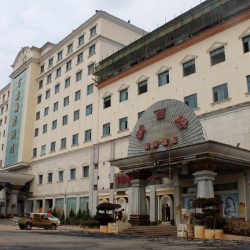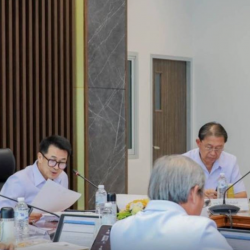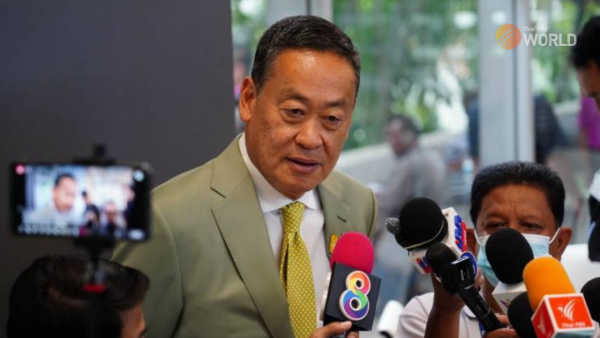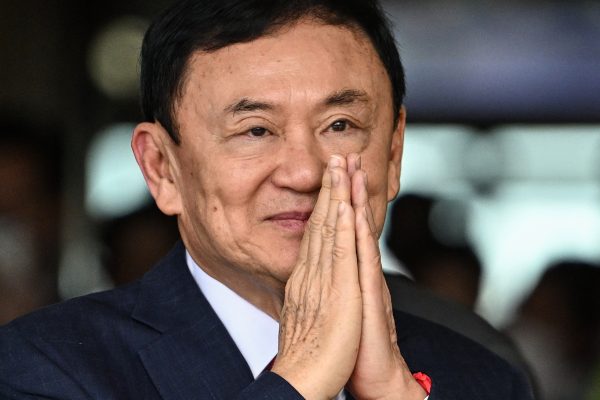Theหวย ปฏิทิน จีน ruling Pheu Thai Party is encountering resistance from the military to its idea of transferring businesses controlled by the armed forces to other agencies.
The House of Representatives set up an ad hoc committee in late January to study ways to remove business out of the military’s control in a bid to block avenues of unregulated profit and corruption, and get the armed forces to stay focused on their main duty, which is national defense.
The 25-member committee chaired by Jirayu Huangsub from the Pheu Thai Party comprised politicians and academics, including Thanathorn Juangroongruangkit, former leader of the dissolved Future Forward Party, Puangthong Pawakapan, a political scientist from Chulalongkorn University, and Bencha Saengchan, an opposition MP from the Move Forward Party.
Politicians from the government side were at odds with the stance of the opposition.
While the opposition was firm that the armed forces should not be involved in any business, the government side seemed disinclined to ruffle the feathers of the generals.
Mongkhon Buddhawaong from the Army, Chayut Nawesphutikorn from the Navy and Jakkrit Thammawichai from the Air Force, representing all the three branches of the armed forces, also were members of the committee. They performed their duty of protecting the military’s interests and defending their policy of doing business.
Scanty details
The committee set up two sub-committees on the energy sector as well as sport and entertainment business for specific scrutiny in a move to get clear information on the details of the businesses, which expectedly generate huge revenues for the military.
The panel, however, needed to extend its mandatory time frame for another 90 days at the end of April as they obtained only aggregate information without any details from the armed forces and relevant agencies, preventing it from seeing the whole picture of the military’s economic activities.
Jirayu, who is also a spokesperson of the Defense Ministry, told local media recently that the committee needed more time to look into various businesses to decide whether it was necessary for the military to do such businesses.
The task of transferring businesses out of the military’s control needed to be achieved as it was a crucial part of the military reform agenda promised by the Pheu Thai-led government, he said.
Some businesses, such as the electricity service provided by the Navy in Sattahip district, badly needed to be transferred to the Provincial Electricity Authority (PEA) for better performance and service to the people in the area, he said.
The Navy could generate energy and use it for security purposes in the Sattahip naval base, but it did not make any sense for the military to sell electricity to the people for commercial purposes, he said.
Bencha, who is a vice chairperson of the committee, said she had received complaints from local residents in Sattahip that electricity sold by the Navy was more expensive than the price set by the PEA, but the people had no choice as electricity service in the area was monopolized by the Navy.
The members of the committee, especially from the opposition Move Forward Party, also wanted to move the Air Force-run Kantarat Golf Course out of the Don Mueang Airport area for security reasons and also convert the Dhupatemiya Golf Course in Pathum Thani province into a public park.
Representatives from the Air Force testifying to the committee argued that the Don Mueang golf course was unique to Thailand and that the International Civil Aviation Organization had guaranteed safety.
The Dhupatemiya Golf Course and its vicinity were reserved for strategic air defense systems, they said.
A long history
The Thai military has been involved in economic activities since the middle of the 20th century, but intensified its investments in enterprises in the 1960s during the military rule of Marshal Sarit Thanarat who commissioned the armed forces to run businesses for economic development as the private sector then was still weak.
The military has since then been involved in a wide range of businesses, including drilling for oil, electricity generation and distribution, retail trading, real estate development, broadcasting as well as insurance, finance and banking.
Mismanagement and economic conditions have caused loss, closure, and bankruptcy of many enterprises owned or run by the military over the past decades.
Sarit’s brainchild, the Thai Military Bank established in 1963, for example, became TMB Thanachart (TTB) in 2019 after struggling to survive following the 1997 Asian financial crisis.
The Army retains an insignificant stake in TTB and many military units enjoyed services of the bank just because of its historical background.
The armed forces are in possession of huge tracts of land across the country, but they have never revealed the extent of their holdings.
A representative of the Defense Ministry told the committee that units under the ministry jurisdiction held more than 5 million rai (800,000 hectares) of land across the country, while MP Bencha told a session in the House of Representatives that the military possessed at least 7.5 million rai (1.2 million hectares) of land.
The armed forces utilized such land beyond military activities, and many of them had commercial objectives, such as golf courses and accommodation that could generate income for not only the military units but also for their commanders, she said.
Business for welfare
Representatives of the armed forces told the committee during a series of testimonies over the past months that the military was running businesses to have an extra budget for spending on troop welfare, especially for those in the junior ranks, rather than making a profit like the private sector.
They said the money earned from the businesses went towards the education of their children, providing insurance, and subsidies for their housing and daily life.
They also argued that the armed forces needed golf courses to entertain their officers.
Hotels and resorts in many prime locations, such as Hua Hin and Ao Manao in Prachuap Khiri Khan province, pay for troops and members of their families to have budget accommodation during vacations, they added.
“The armed forces need to run business for our own welfare. Our officers and troops cannot afford expensive green fees in private-run golf courses or five-star hotels in many resort beaches,” said an officer, who was not authorized to speak in public.
Lack of financial detail
The representatives of the armed forces, who testified at the committee, said many businesses run by the military suffered financial losses, as they were unable to compete with private businesses in the same sector.
While claiming that the military ran the businesses with transparency, the military refused to provide financial and auditing reports to the committee.
All businesses have already been examined and audited by the armed forces’ internal auditors, they said.
Committee member Thanathorn frequently asked for financial and audit reports from the officials and military units which run the businesses but did not get them, according to a source close to the panel.
“The military claimed transparency but never showed accountability to the public and Parliament,” he said, and added that the officials who testified before the committee said the financial reports were mostly confidential.
“A senior officer even told the committee that we could request all kinds of financial documents but he could guarantee that we would never get any substantial one,” said the source.
Without financial reports, it would be difficult for the panel to evaluate the business viability of the enterprises under military control, the source said.
The military obviously wants the committee to fail in achieving its objective, he said.
By Thai PBS World’s Political Desk

Myanmar ethnic armed group executes three personnel

Private hospital fined Bt100,000 for refusing emergency treatment
Related News

Srettha still struggling with funding for digital wallet scheme

Cadmium scandal sheds light on loopholes in Thai law on hazardous waste

Thaksin’s most complicated mission ever

As geopolitical tensions rock the world, gold gains in value
Recent Posts
- Srettha and Thaksin meet over cabinet reshuffle speculationApril 25, 2024
- Private hospital fined Bt100,000 for refusing emergency treatmentApril 25, 2024
- Military digs in to beat back attempts to end its role running businessesApril 25, 2024
- Myanmar ethnic armed group executes three personnelApril 25, 2024
- Thai banks agree to reduce lending rates by 0.25% for six monthsApril 25, 2024
Thai PBS WorldTweets by ThaiPBSWorld






